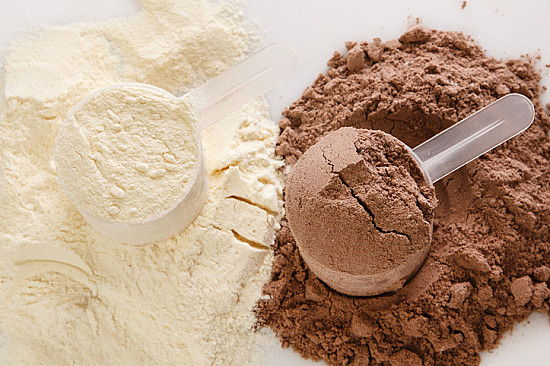
Protein Powders have become a staple for fitness enthusiasts, particularly in gyms and for those dedicated to their workout routines. With numerous options available, it’s essential to understand the benefits of protein powder, the various types, and which ones best suit your health and fitness goals. This guide will explore everything you need to know about protein powders, ensuring you make informed decisions to enhance your nutrition and fitness.
What Are Protein Powders?
Protein powders are dietary supplements made from animal or plant-based sources. They are used to help increase protein intake, supporting muscle repair, recovery, and overall health.
Benefits of Protein Powder
- Muscle Building: Protein is vital for muscle growth. Including protein powder in your diet can help you achieve your muscle gain goals more efficiently.
- Weight Management: Protein powders can assist in weight loss by promoting satiety, helping you feel fuller for longer and reducing overall calorie intake.
- Convenience: For those with a busy lifestyle, protein powders provide a quick and easy way to meet your daily protein needs.
- Recovery Support: Consuming protein post-workout aids in muscle recovery, reducing soreness and promoting faster healing.
- Balanced Nutrition: Protein powders can help you achieve a high-protein diet, ensuring you’re meeting your nutritional requirements.
Types of Protein Powder
There are various types of protein powders available, each with its unique benefits. Here are the most common types:
1. Whey Protein
- Description: Whey protein is derived from milk during the cheese-making process. It is a complete protein, meaning it contains all nine essential amino acids.
- Benefits:
- Rapid absorption, making it ideal for post-workout recovery.
- Rich in branched-chain amino acids (BCAAs), which are crucial for muscle growth and repair.
- Best For: Those looking to gain muscle and recover quickly after workouts.
2. Casein Protein
- Description: Another milk-derived protein, casein is digested more slowly than whey.
- Benefits:
- Provides a steady release of amino acids over several hours, making it suitable for nighttime use.
- Best For: Individuals looking for sustained protein release throughout the night.
3. Soy Protein
- Description: A popular plant-based protein made from soybeans.
- Benefits:
- Contains all essential amino acids and is beneficial for heart health.
- Suitable for vegans and vegetarians.
- Best For: Those seeking a plant-based protein alternative.
4. Pea Protein
- Description: Derived from yellow peas, it’s a great option for vegans.
- Benefits:
- Easily digestible and rich in BCAAs.
- Low in allergens compared to whey and soy.
- Best For: Those with lactose intolerance or soy allergies.
5. Hemp Protein
- Description: Made from hemp seeds, this protein powder is rich in omega-3 fatty acids.
- Benefits:
- Contains fiber, which aids in digestion.
- Provides a complete protein profile.
- Best For: Those looking for a nutritious, plant-based protein source.
6. Egg Protein
- Description: Made from egg whites, this protein is highly bioavailable.
- Benefits:
- Offers a complete amino acid profile.
- Low in fat and carbohydrates.
- Best For: Individuals who are not allergic to eggs and prefer animal-based protein.
Best Protein Powder for Muscle Gain
When looking for the best protein powder for muscle gain, whey protein is often considered the top choice due to its quick absorption and high BCAA content. Other excellent options include casein protein for sustained release and egg protein for its complete amino acid profile.
Best Protein Powder for Weight Loss
For weight loss, plant-based protein powders like pea and hemp are excellent options. They are typically lower in calories and fat while providing the essential nutrients your body needs. Additionally, whey protein can also aid in weight loss due to its high satiety levels.
How to Incorporate Protein Powders
Incorporating protein shakes into your diet is straightforward:
- Post-Workout: Consume a protein shake within 30 minutes after your workout for optimal muscle recovery.
- Meal Replacement: Use protein powder as a meal replacement or snack to help manage weight.
- Smoothies: Add protein powder to smoothies for a nutritious breakfast or snack.
- Baking: Incorporate protein powder into baked goods like pancakes or muffins for an extra protein boost.
Protein Powder Side Effects
While protein powders can offer numerous benefits, it’s essential to be aware of potential side effects:
- Digestive Issues: Some individuals may experience bloating, gas, or digestive discomfort, particularly with whey protein.
- Allergic Reactions: Those allergic to dairy, soy, or eggs should avoid specific protein powders.
- Excessive Intake: Consuming protein powder in excessive amounts can lead to kidney strain and nutrient imbalances.
Choosing the Right Protein Powder
When selecting a protein powder, consider the following factors:
- Dietary Restrictions: Choose a protein powder that fits your dietary preferences (e.g., vegan, lactose-free).
- Purpose: Identify your goals—muscle gain, weight loss, or general nutrition.
- Ingredients: Look for powders with minimal added sugars and fillers.
- Quality: Opt for reputable brands that undergo third-party testing for quality and safety.
Conclusion
Incorporating protein powders into your diet can significantly enhance your health and fitness journey. With various options available, from whey protein benefits to plant-based protein powders, there’s something for everyone. Remember to consider your personal health goals and dietary needs when choosing the right protein powder for your gyms and workout routines. By understanding the benefits of protein powder, you can make informed choices that support your high-protein diet and overall wellness